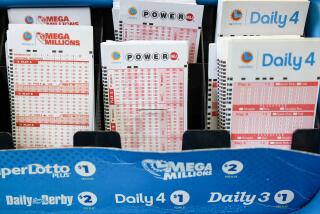Governor Finds No Criminal Act on Lottery Pact
- Share via
SACRAMENTO — Gov. Pete Wilson absolved state lottery officials of any criminal wrongdoing in their handling of a lucrative computer contract Tuesday but acknowledged that an internal audit raised troubling questions about the agency’s bidding procedures.
In a letter to Lottery Commission Chairman John Price, Wilson said he could find no evidence that Director Sharon Sharp or her staff had deliberately favored the GTECH corporation, a Rhode Island-based company that submitted the only bid for a $500-million contract to operate the agency’s computerized games.
But Wilson said a special task force that conducted a monthlong inquiry had concerns about the lottery agency’s “ability to conduct major procurements.” Without spelling out what those concerns were, Wilson suggested that in the future the lottery should do more homework on prospective bidders.
The governor’s findings immediately prompted an announcement by a legislative committee that it would open its own inquiry into lottery bidding procedures.
“We just can’t take the governor’s word for it that, ‘Yeah, they found troubling problems in the lottery’s ability to do these major procurements’ and then not ask what and why. It’s state money and it’s a huge contract,” said Assemblyman Curtis Tucker Jr. (D-Inglewood), chairman of the Governmental Operations Committee that oversees the lottery.
Tucker said he would ask lottery officials to delay awarding the contract until the committee has finished its hearings.
Lottery director Sharp, however, said the agency would continue to evaluate the lone bid and intended to present its recommendation soon for the awarding of the contract to the California State Lottery Commission. She said in a statement that she felt the governor’s findings vindicated lottery officials and “reaffirmed the integrity of the lottery’s procurement process.”
Wilson had taken the usual step of ordering an internal audit after two computer companies declined to bid on the new contract, charging that the process so favored one company that it was impossible to compete.
They contended that the bid specifications gave them too little time to complete the requirements of the contract, which called for the installation of an entirely new computer system and the replacement of 13,000 terminals. The six-month time frame, they said, favored GTECH, which currently holds the contract to operate the Super Lotto, Fantasy Five, Daily Three, Decco and Keno games and has the advantage of having staff and materials already in place in California.
Janice Brown, the governor’s legal counsel who headed the task force, said the panel concluded after reviewing videotapes of Lottery Commission hearings and piles of documents that the lottery had made every effort to avoid favoring GTECH.
She said officials had tried to accommodate competitors by twice extending the deadline for completing installation of the new system.
“I think clearly that there is no evidence that the lottery or any one associated with the lottery was doing anything to give this to GTECH,” she said.
The governor’s findings produced varied interpretations from competing computer companies. Robert J. Rendine, a spokesman for GTECH, said they confirmed that the process was “fair, open and conducted with the highest integrity.”
But Richard Martland, an attorney for Automated Wagering International, noted that the governor had not specifically found the process to be open and fair. Instead, he said, Wilson had found that there was no “fraud, corruption, bid rigging or other misconduct.”
More to Read
Sign up for Essential California
The most important California stories and recommendations in your inbox every morning.
You may occasionally receive promotional content from the Los Angeles Times.













